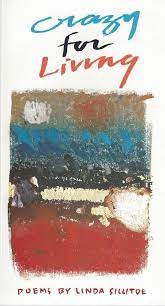Articles/Essays – Volume 27, No. 2
Secrets under the Surface | Linda Sillitoe, Crazy for Living: Poems
Just under the surface of the obvious lie the secrets. Linda Sillitoe sees, hears, tastes them, feels where they lead, trusts them, takes us along. It is never a perilous journey. Rather, it resounds with understanding and connectedness.
As a journalist she sees beginnings and ends. Behind her observations is always the story. Images are accurate and suggestive of more: In “Driving to Work in Winter,” she tells us “Possibilities appear before me like green semaphores.” So do they in her poems.
In “Writing Copy” the grotesque in the news floods into a real day and “the sheepish guy in the parking/ terrace who waits in his warm car.” Sillitoe’s encounters with the otherwise hidden seep into her lines and into the consciousness of the reader. By some sub terranean tug we follow “the journalist” “like our lost halos/ tipping us to/ who rolls our spotty dice/ in every game.”
In “November’s End, 1979,” we see “women in a yellow room,/ and me seeing not the future/ but us where we were/ like dew on a slick leaf/ in the murmurous night.”
This musical maneuvering is the poet with a keen ear and eye interpreting disillusionment in “an elegy in lower case” as eloquently as transcendence in “sonnet for spring” or nostalgia in “During Recess.”
In “Killer” the poet merges with the Navajo sun that attracts her deepest yearning and cleanses her of the night mares of a murderer she has written about in her earlier Salamander: The Story of the Mormon Forgery Murders, and concludes with deadly aim, “a sane man lives by his heart./ A crazy man lives in his head.”
In Part II, “Journeys in Tandem,” cadence flows undeterred by invasion of other forces than the different two’s together, in “an intricate, slow unfolding” or crickets “violining melodies pitched/ between currents of our speech.” She can explain on that enchanted lower level and sometimes in lower case the attachments, the arrivals, the leavings, full of the poignancy, the joys, the flailings—of family, lover, generations, the earth, even creation.
Armed with infallible instinct, Silli toe is never dull—or without surprise. Whimsy startles a wry encounter with reality in “To an ESTJ from an INFP with love”: “Threads become dust, an archivist’s foe. I can always do it again.”
In the title poem, “crazy for living,” she convinces us “we hone our weapons carelessly/ and hide our injuries./ we never cry.” Separation pulls at the time together as “we huddle and circle, we fly as if unaware/ that an explosion coils in every flower’s heart.”
Section III, “Journeys Between,” moves seamlessly into the mystic to “see how far we can go against what cur rents/ only to reach old shores in unexpected ways.” The poet provides the passage and the travel, drawing on her intimate acquaintance with Indian lore and practice together with her intuitive connection to the land and those who live in harmony with it. A crystal or an eagle can be medicine for a shattered spirit in “exploring a strange land through the narrow passages/ where harm does not come” (“Journey Poem 1”).
Loveliness plays counterpoint to scavenging just as the poet is “soothed and disturbed” (“Journey Poem II”) “drawn by the vortex” (“Journey Poem III”) of what “happened before—the vision and the road block.”
From these poems comes a new enlightening and lifting, yes, even a lilt, in the face of distance and return to the commonplace: “Now in the barn, you sing to your horses/ as you pour out their oats. That song enters/ my window now as I prepare dinner,/ winding peace around me, a soft balancing light
Like a healer herself, Linda Sillitoe sees the miracle as “everything connects, the fissures race.” She has seen “eagle feathers die and live again.” She has held stones that “fit my hands,” that “soften as we learn/ a common pulse.”
This poet and these poems are messengers of heart, mind, and spirit that bring their mystery and magic as alive and rewarding to me as if they were my own. With Linda I can be sure “Tonight where the sky is whole/ mesa to mesa, no clouds, no lights/ but theirs, the little people pipe / their own melodies around the moon.”
Read these poems and find the stars.
Crazy for Living: Poems. By Linda Sillitoe (Salt Lake City: Signature Books, 1993).


 Back to full Issue
Back to full Issue

